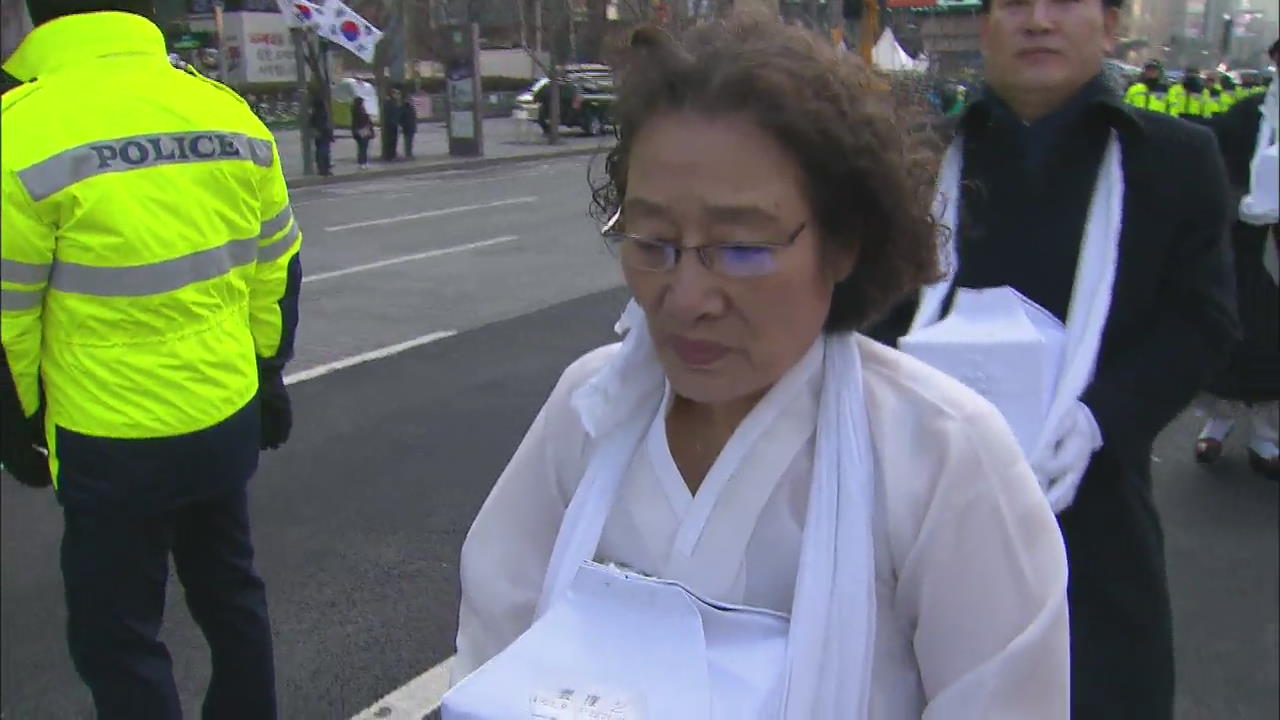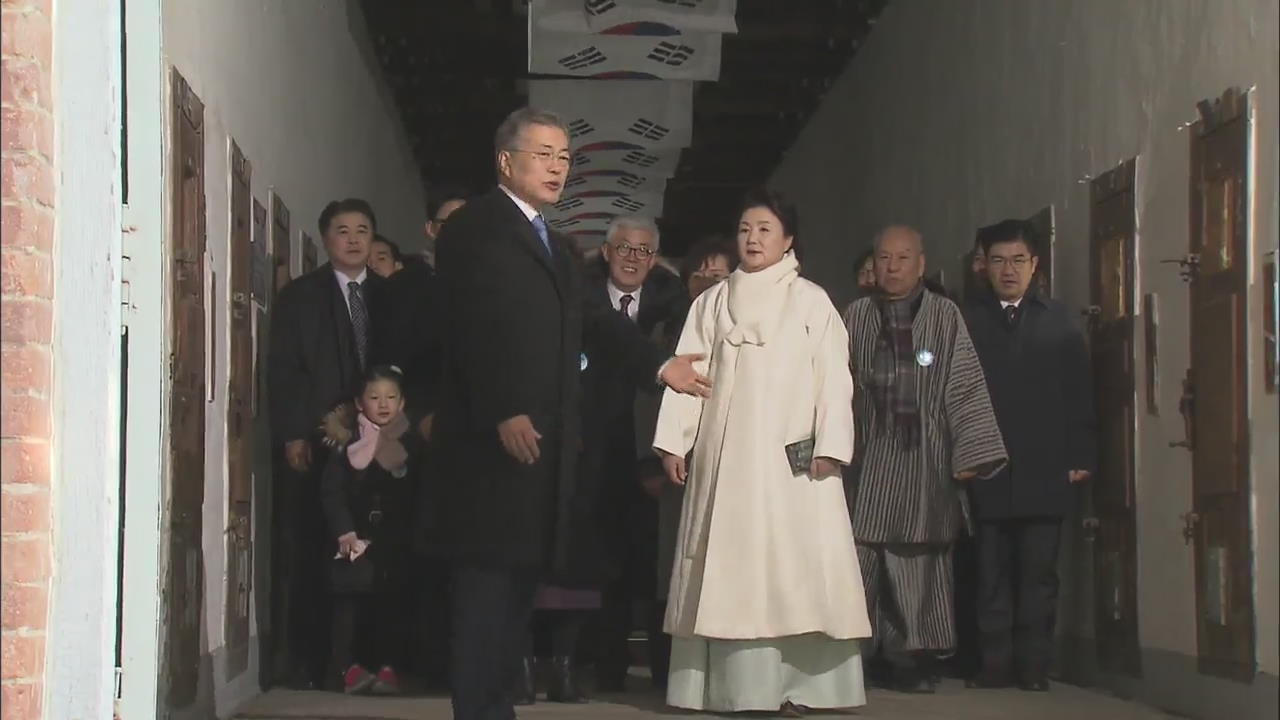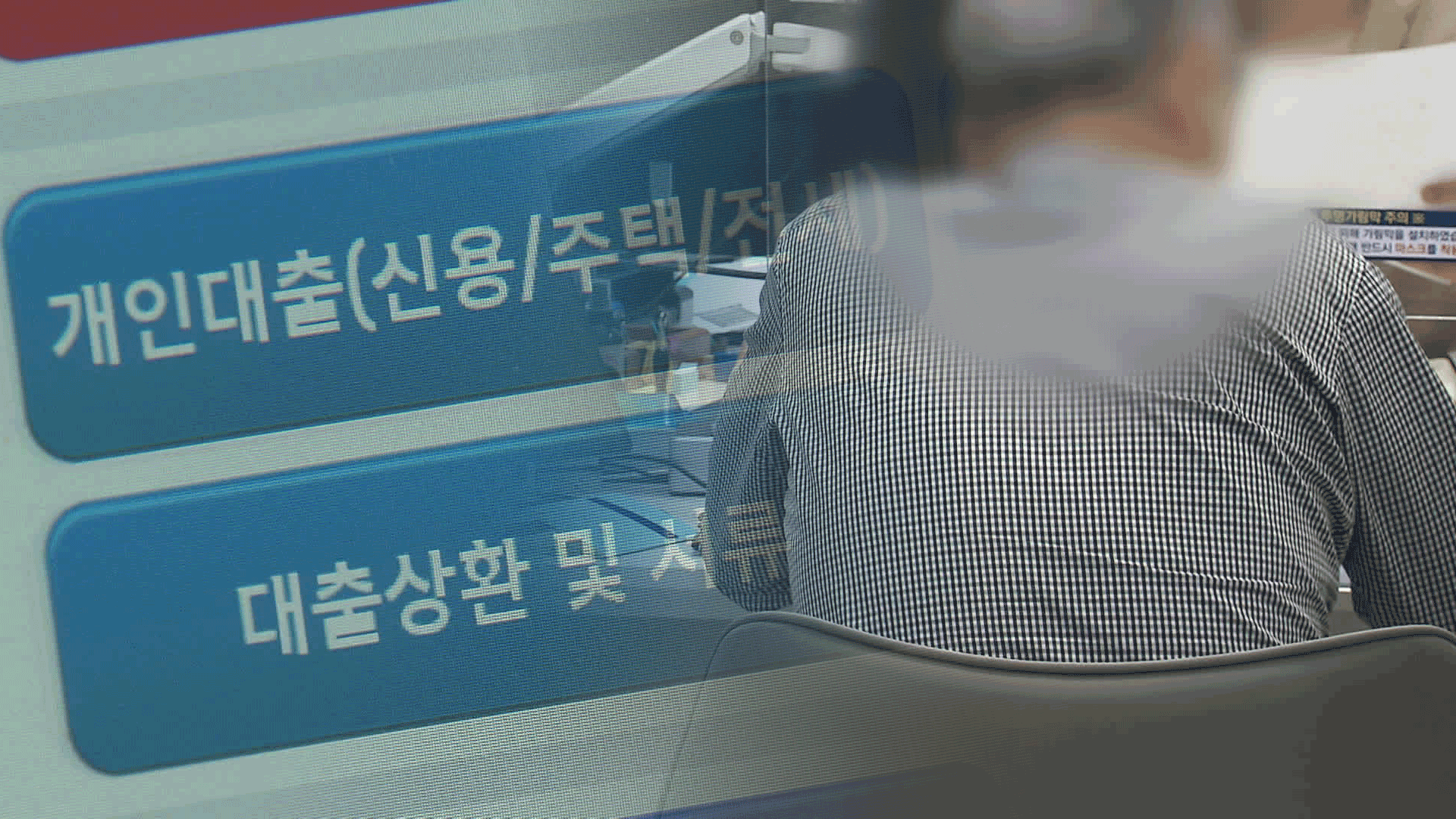Return of Remains
입력 2018.03.02 (15:22)
수정 2018.03.02 (16:40)
읽어주기 기능은 크롬기반의
브라우저에서만 사용하실 수 있습니다.
[Anchor Lead]
In commemoration of the March 1st independence movement, the remains of 33 Koreans who were forced into hard labor by the imperial Japanese were returned to Korea. In addition, several events recreating the March 1st freedom march took place nationwide.
[Pkg]
People carry the urns holding the remains of Korean laborers forced to work during the Japanese colonial period. The 33 workers were taken to Japan and spent the rest of lives working in mines or military factories. In marking the 99th anniversary of the March 1st independence movement, their remains were at last brought home, more than 70 years after Korea's liberation.
[Soundbite] Kim Mi-yeon(Seoul Resident) : "They should have come home earlier, but I'm thankful that they're here now."
They were part of some 1,000 victims with no family ties. Their remains have been kept at a Tokyo temple for the Korean-Japanese. This is the second such event since the previous one, which occurred on last year's Independence Day on August 15th.
[Soundbite] Lee Su-ho(Group Overseeing the Return of Remains) : "The remains of about 400,000 people have been found. We should clean up the painful history."
The remains will visit Dorasan Station, near the North Korean border, and will be put to rest at a Seoul municipal memorial park. People shout, "hurray" just like they did on the same day 99 years ago. From Jeju Island, the most southern tip of Korea...To Seoul!
[Soundbite] "Hurrah! Hurrah!"
People of all ages, from young children to senior citizens, march together with Korean flags in their hands. Koreans remembered the meaning of autonomy and independence while watching a stage play about the sacrifices of freedom fighters and reciting the Declaration of Independence. When the Korean flag arrived at Bosingak Bell in central Seoul, the bell rang out 33 times to spread the spirit of the anti-colonial Japan movement.
In commemoration of the March 1st independence movement, the remains of 33 Koreans who were forced into hard labor by the imperial Japanese were returned to Korea. In addition, several events recreating the March 1st freedom march took place nationwide.
[Pkg]
People carry the urns holding the remains of Korean laborers forced to work during the Japanese colonial period. The 33 workers were taken to Japan and spent the rest of lives working in mines or military factories. In marking the 99th anniversary of the March 1st independence movement, their remains were at last brought home, more than 70 years after Korea's liberation.
[Soundbite] Kim Mi-yeon(Seoul Resident) : "They should have come home earlier, but I'm thankful that they're here now."
They were part of some 1,000 victims with no family ties. Their remains have been kept at a Tokyo temple for the Korean-Japanese. This is the second such event since the previous one, which occurred on last year's Independence Day on August 15th.
[Soundbite] Lee Su-ho(Group Overseeing the Return of Remains) : "The remains of about 400,000 people have been found. We should clean up the painful history."
The remains will visit Dorasan Station, near the North Korean border, and will be put to rest at a Seoul municipal memorial park. People shout, "hurray" just like they did on the same day 99 years ago. From Jeju Island, the most southern tip of Korea...To Seoul!
[Soundbite] "Hurrah! Hurrah!"
People of all ages, from young children to senior citizens, march together with Korean flags in their hands. Koreans remembered the meaning of autonomy and independence while watching a stage play about the sacrifices of freedom fighters and reciting the Declaration of Independence. When the Korean flag arrived at Bosingak Bell in central Seoul, the bell rang out 33 times to spread the spirit of the anti-colonial Japan movement.
■ 제보하기
▷ 카카오톡 : 'KBS제보' 검색, 채널 추가
▷ 전화 : 02-781-1234, 4444
▷ 이메일 : kbs1234@kbs.co.kr
▷ 유튜브, 네이버, 카카오에서도 KBS뉴스를 구독해주세요!
- Return of Remains
-
- 입력 2018-03-02 15:13:03
- 수정2018-03-02 16:40:15

[Anchor Lead]
In commemoration of the March 1st independence movement, the remains of 33 Koreans who were forced into hard labor by the imperial Japanese were returned to Korea. In addition, several events recreating the March 1st freedom march took place nationwide.
[Pkg]
People carry the urns holding the remains of Korean laborers forced to work during the Japanese colonial period. The 33 workers were taken to Japan and spent the rest of lives working in mines or military factories. In marking the 99th anniversary of the March 1st independence movement, their remains were at last brought home, more than 70 years after Korea's liberation.
[Soundbite] Kim Mi-yeon(Seoul Resident) : "They should have come home earlier, but I'm thankful that they're here now."
They were part of some 1,000 victims with no family ties. Their remains have been kept at a Tokyo temple for the Korean-Japanese. This is the second such event since the previous one, which occurred on last year's Independence Day on August 15th.
[Soundbite] Lee Su-ho(Group Overseeing the Return of Remains) : "The remains of about 400,000 people have been found. We should clean up the painful history."
The remains will visit Dorasan Station, near the North Korean border, and will be put to rest at a Seoul municipal memorial park. People shout, "hurray" just like they did on the same day 99 years ago. From Jeju Island, the most southern tip of Korea...To Seoul!
[Soundbite] "Hurrah! Hurrah!"
People of all ages, from young children to senior citizens, march together with Korean flags in their hands. Koreans remembered the meaning of autonomy and independence while watching a stage play about the sacrifices of freedom fighters and reciting the Declaration of Independence. When the Korean flag arrived at Bosingak Bell in central Seoul, the bell rang out 33 times to spread the spirit of the anti-colonial Japan movement.
In commemoration of the March 1st independence movement, the remains of 33 Koreans who were forced into hard labor by the imperial Japanese were returned to Korea. In addition, several events recreating the March 1st freedom march took place nationwide.
[Pkg]
People carry the urns holding the remains of Korean laborers forced to work during the Japanese colonial period. The 33 workers were taken to Japan and spent the rest of lives working in mines or military factories. In marking the 99th anniversary of the March 1st independence movement, their remains were at last brought home, more than 70 years after Korea's liberation.
[Soundbite] Kim Mi-yeon(Seoul Resident) : "They should have come home earlier, but I'm thankful that they're here now."
They were part of some 1,000 victims with no family ties. Their remains have been kept at a Tokyo temple for the Korean-Japanese. This is the second such event since the previous one, which occurred on last year's Independence Day on August 15th.
[Soundbite] Lee Su-ho(Group Overseeing the Return of Remains) : "The remains of about 400,000 people have been found. We should clean up the painful history."
The remains will visit Dorasan Station, near the North Korean border, and will be put to rest at a Seoul municipal memorial park. People shout, "hurray" just like they did on the same day 99 years ago. From Jeju Island, the most southern tip of Korea...To Seoul!
[Soundbite] "Hurrah! Hurrah!"
People of all ages, from young children to senior citizens, march together with Korean flags in their hands. Koreans remembered the meaning of autonomy and independence while watching a stage play about the sacrifices of freedom fighters and reciting the Declaration of Independence. When the Korean flag arrived at Bosingak Bell in central Seoul, the bell rang out 33 times to spread the spirit of the anti-colonial Japan movement.
이 기사가 좋으셨다면
-
좋아요
0
-
응원해요
0
-
후속 원해요
0















![[단독] 윤석열 정부, ‘대통령실 공사비 미지급’ 피소](/data/news/2025/06/30/20250630_8MRvHk.png)

이 기사에 대한 의견을 남겨주세요.